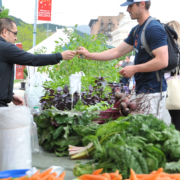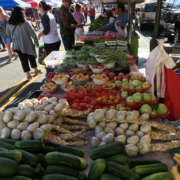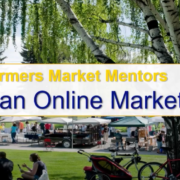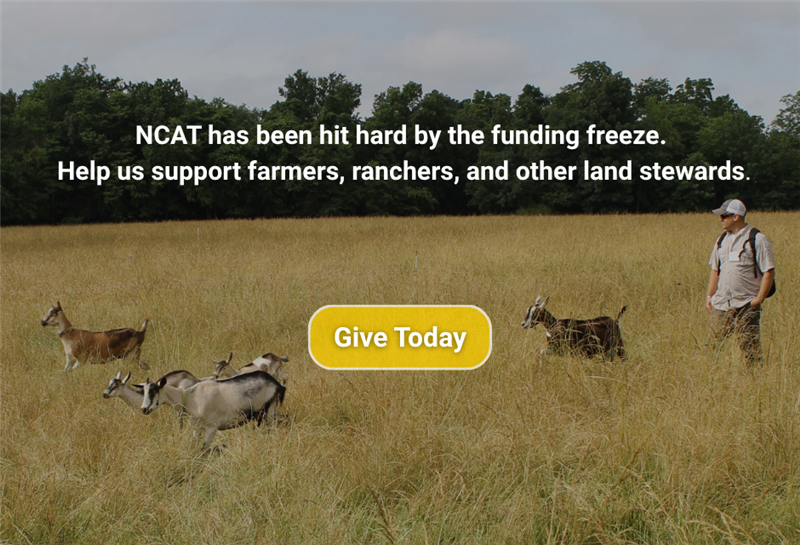National Farmers Market Week 2021 Demonstrates that Farmers Markets are Essential
 Print This Post
Print This Post
By Tammy Howard, Horticulture Specialist
National Farmers Market Week happens annually during the first week of August. This year, as we celebrate farmers markets, I found myself reflecting on the adaptability and flexibility that our farmers markets have provided for small to mid-scale farmers and consumers throughout the country. Here in Montana, our farmers market managers worked tirelessly to keep people safe while providing a crucial marketing channel for farmers, ranchers, and artisans in 2020. Their efforts included adapting traffic flow, online marketing tools, and enhanced sanitation practices.
Farmers markets and CSAs saw a 35% increase in people using these outlets in 2020, according to the 2020 Local Food System Response to COVID Consumer Food Insights Survey. This was important as farmers and ranchers had to shift their marketing strategies due to lost sales in other supply chains, including schools and restaurants. Farmers markets provide low-barrier entry points for new farmers, ranchers, and food entrepreneurs, allowing them to start small and test new products. Direct marketing through CSAs and farmers markets make up the majority of income for young and beginning farmers.
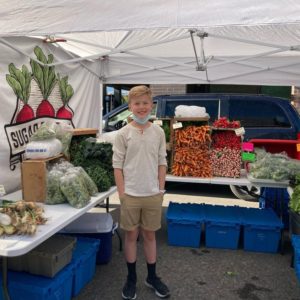
Photo: Sugar Beet Row Farm
As I reflected on the essential role that farmers markets have played in helping farmers shift their marketing strategies amid the pandemic, I wanted to check in with a beginning farmer that I assisted through the ATTRA program a few years ago to see how his farm weathered the pandemic and supply chain disruptions. Rick Williams operates Sugar Beet Row Farm, a ½-acre, mixed vegetable farm based in Whitehall, Montana, and sells his product through a few farmers markets in the area.
Rick had this to say about his farmers market sales: “The farmers market has helped me grow my business in a few ways. It has given me a stable revenue stream so that I can strategically scale up the farm without uncomfortable levels of uncertainty and risk. Community exposure at the farmers market has also given me news sales opportunities, such as lettuce to a racing event dinner, strawberries to a mobile lemonade stand, and vegetables to a geology field camp. The farmers market has also given me the opportunity to direct customers to the local health food store that sells my microgreens, which has led to a nice boost in microgreen sales.”
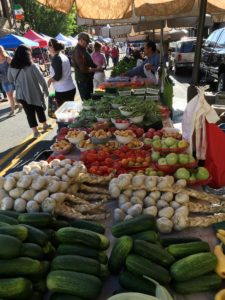
Farmers market in Butte, Montana. Photo: Butte Farmers Market
Because restaurant sales were risky during the pandemic, Rick didn’t bother connecting with restaurants at that time, but when he did reach out in this post-pandemic period, the restaurant had to stop buying from him in order to scale back due to staffing shortages. “Now I’m turning over the lettuce beds to other things, and I’m gun-shy about taking on restaurant accounts in the future. I’ll continue to focus on direct-to-consumer sales for the near term. In short, the pandemic influenced my marketing choices at startup, and it continues to cause me to redirect my marketing channels,” he said. Rick is sticking with farmers markets for the time being and integrating his kids into selling.
At the peak of the 2021 farmers market season, many farmers markets throughout the country continue to see sustained customers. In Montana, market managers voted on and chose a state specific slogan “Bounty of the Big Sky.” As we share our appreciation of farmers markets this week, it is important to acknowledge that farmers are the backbone of our markets. They provide the healthy and local foods that customers are looking for. As the farm and food supply chains continue to see disruptions, our farmers markets play an essential role for accessing local healthy food and providing a stable and risk free entry point for farmers.
Related Resources:
Tips for Selling at Farmers Markets
This blog is produced by the National Center for Appropriate Technology through the ATTRA Sustainable Agriculture program, under a cooperative agreement with USDA Rural Development. ATTRA.NCAT.ORG.

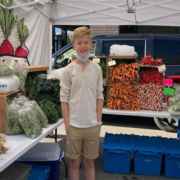
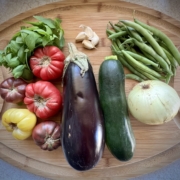
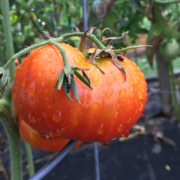
 ncat
ncat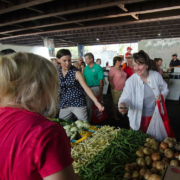 USDA Photo by Lance Cheung.
USDA Photo by Lance Cheung. 